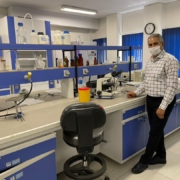SARS-CoV-2 proteome harbors peptides which are able to trigger autoimmunity responses: implications for infection, vaccination, and population coverage
Following their research line regarding the COVID-19, Dr. Khalili and Dr. Zakeri from the Department of Biological Sciences of Shahid Rajaee University, have achieved a new success. The group’s recent study on the autoimmune risks of COVID-19 or its vaccination is accepted in the prestigious journal of “Frontiers in Immunology” with an impact factor of 7.6. In this study, Dr. Khalili and Zakeri, along with other colleagues, examined more than 48,000 peptides from the proteome of the SARS-CoV-2 and compared them with the human proteome. Immunological examination of these peptides showed that the SARS-CoV-2 virus had surprisingly high peptide similarities to human protein content, which increased the possibility of the immune system failing to tolerate its own protein. This means that the immune system, due to excessive exposure to these similar peptides, considers them outsiders and eventually attacks its own proteins, resulting in autoimmune complications. Given the high rate of infection and the high volume of vaccinations being performed, it seems necessary to pay attention to these consequences and to adopt appropriate treatment policies. However, according to the predictions, our country Iran is in the yellow zone of these consequences and the countries of Southeast Asia will be more vulnerable. This study draws attention towards people with a history of autoimmune complications and recommends the use of vaccines with the least autoimmune consequences.




